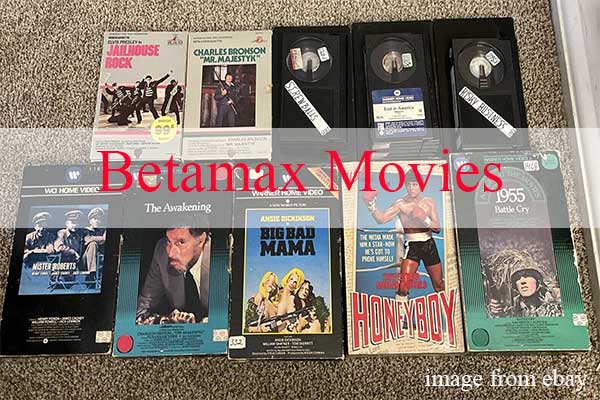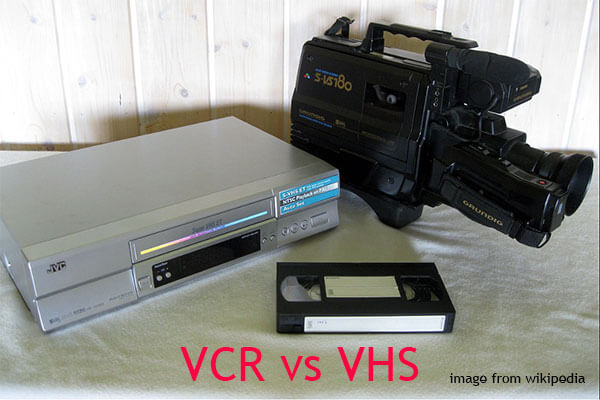In the late 1970s and early 1980s, an intense format war took place that would ultimately shape the way we consume and record video content in our homes. This battle was between two competing video cassette formats: VHS and Betamax. The rivalry between VHS and Betamax was fierce, with both sides vying for dominance in the emerging home video market. However, despite being technically superior, Betamax ultimately lost to VHS. So, what led to the downfall of Betamax and the triumph of VHS? Just find the reasons in this article offered by MiniTool video compressor.
VHS vs Betamax: Why Did VHS Beat Betamax?
The following compares several aspects of Betamax and VHS to show why did Betamax lost to VHS.
Betamax vs VHS Quality
The Betamax format, developed by Sony, was the first to hit the market in 1975. It offered better picture quality and resolution compared to VHS, and many early adopters considered it the superior choice. However, JVC’s VHS format, which was released a year later, soon gained traction due to its longer recording time. VHS tapes could store up to two hours of content, while the initial Betamax tapes could only hold one hour. This longer recording time was a significant advantage for VHS, as consumers wanted to be able to record and watch full-length movies without interruption.
VHS or Betamax Strategy
Another critical factor in VHS’s success was the strategy adopted by JVC. Unlike Sony, which maintained strict control over the Betamax format, JVC adopted a more open approach. They allowed other manufacturers to license VHS technology, resulting in a wide range of VHS-compatible devices flooding the market. This led to greater availability and lower prices for VHS players and recorders, making it the more affordable option for consumers.
Betamax Tape vs VHS: Availability
Furthermore, the availability of pre-recorded movies played a crucial role in VHS’s victory. Movie studios and rental stores overwhelmingly favored the VHS format, as it offered longer recording times, better marketing deals, and greater market penetration. This led to a vast library of movies being available on VHS, making it the preferred choice for consumers who wanted access to a wide range of content.
The VHS format’s open approach also facilitated the development of third-party accessories and innovations. One such innovation was the VHS-to-Betamax adapter, which allowed Betamax owners to play VHS tapes on their Betamax machines. This gave VHS an additional advantage, as consumers who were initially hesitant to invest in VHS could still enjoy VHS content on their Betamax devices. The adaptability of VHS further solidified its market dominance.
VHS Outsold the Technically Superior Betamax Videocassette Format Because
While Betamax was technically superior, offering better picture quality and superior audio, these advantages were not enough to outweigh the practical benefits offered by VHS. The longer recording time, affordability, and wider range of content ultimately won over consumers.
The format war reached its tipping point in the mid-1980s when major movie studios, including Sony’s own Columbia Pictures, began releasing movies exclusively on VHS. This dealt a significant blow to the Betamax format and marked a turning point in the battle for home video supremacy. By the late 1980s, VHS had emerged as the clear winner, outselling Betamax by a wide margin.
Sony Betamax Failure
Sony eventually acknowledged the defeat of Betamax and shifted its focus to manufacturing VHS-compatible machines. The company continued to produce Betamax players and tapes until the early 2000s but gradually phased out the format.
VHS vs Betamax: Lesson
The rise and fall of Betamax serve as a reminder that technical superiority alone is not enough to guarantee success in the market. VHS’s strategic alliances, longer recording time, wider availability, and support from movie studios were instrumental in its victory over Betamax. The format war between VHS and Betamax left a lasting impact on the home video industry, shaping the way we consume media and ushering in a new era of home entertainment.
Was Betamax Better Than VHS
Despite the triumph of VHS over Betamax, there are still discussions among technology enthusiasts and historians about whether Betamax was actually superior to VHS in terms of picture and audio quality. Betamax had a higher resolution and better color fidelity, leading some to argue that it provided a more authentic viewing experience. However, the average consumer was not able to discern a significant difference in quality between the two formats, especially considering the limitations of television sets and VCR playback technology at the time.
Another factor that contributed to Betamax’s downfall was its shorter recording time. Although Sony eventually released extended play (EP) Betamax tapes that could hold up to four hours of content, it was too late to reverse the momentum in favor of VHS. VHS had established itself as the standard, and consumers had already invested in VHS-compatible devices.
The failure of Betamax can also be attributed to Sony’s reluctance to license the format to other manufacturers. By keeping a tight grip on Betamax technology, Sony limited its reach in the market. In contrast, JVC’s decision to license VHS to multiple manufacturers resulted in a more significant presence of VHS-compatible devices, giving consumers more options and driving down prices.
Additionally, the format war highlighted the importance of content availability and marketing deals. VHS had the advantage of securing agreements with major movie studios and rental stores, ensuring a vast selection of movies for consumers to choose from. Betamax struggled to secure similar agreements, limiting the availability of popular movies in the format. This disparity in content offerings further tilted the scales in favor of VHS.
The decline of Betamax accelerated in the 1990s with the rise of new technologies such as DVDs and digital video. These formats offered superior quality, longer recording times, and more convenient playback options. Betamax, with its limitations, could not compete effectively against these emerging technologies and gradually faded from the mainstream market.
VHS vs Betamax: Betamax’s Influences
Despite its ultimate failure, Betamax played a crucial role in the evolution of home video technology. It introduced innovations such as the concept of a videocassette recorder (VCR), which revolutionized the way people consumed and recorded video content. Many of the design elements and concepts from Betamax were carried forward and refined in subsequent video formats.
In retrospect, the VHS vs. Betamax format war was a classic example of how market dynamics, content availability, strategic alliances, and consumer preferences can shape the success or failure of a technology. While Betamax was technically superior, VHS’s longer recording time, affordability, open licensing, content agreements, and adaptability to third-party innovations propelled it to victory. The story of VHS and Betamax serves as a valuable lesson in the importance of market strategy, industry partnerships, and understanding consumer needs in the ever-changing landscape of technology.






User Comments :